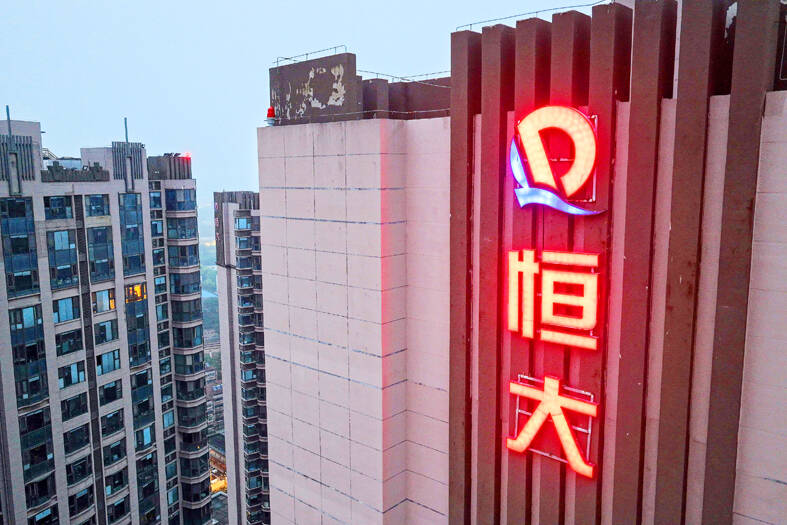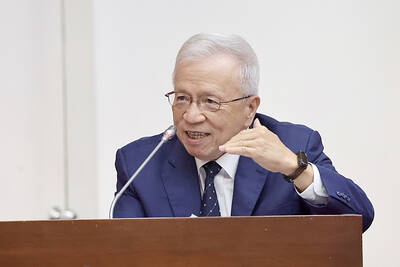Shares in heavily indebted China Evergrande Group (恒大集團) were taken off the Hong Kong Stock Exchange yesterday, capping a grim reversal of fortune for the once-booming property developer.
A committee at the bourse had decided earlier this month to cancel Evergrande’s listing after it failed to meet a deadline last month to resume trading — suspended since early last year.
The delisting is the latest milestone for a firm whose painful downward spiral has become symbolic of China’s long-standing property sector woes.

Photo: AFP
Once the country’s biggest real estate firm, Evergrande was worth more than US$50 billion at its peak and helped propel China’s rapid economic growth over the past few decades.
However, it defaulted in 2021 after years of struggling to repay creditors.
A Hong Kong court issued a winding-up order for Evergrande in January last year, ruling that the company had failed to come up with a suitable debt repayment plan.
Liquidators have made moves to recover creditors’ investments, including filing a lawsuit against PricewaterhouseCoopers LLP and its Chinese arm for their role in auditing the debt-ridden developer.
The firm’s debt load is bigger than the previously estimated amount of US$27.5 billion, a filing earlier this month attributed to liquidators Edward Middleton and Tiffany Wong (黃詠詩) showed.
The statement added that Evergrande was a holding company and that liquidators had assumed control of more than 100 companies within the group.
Evergrande’s saga — and similar issues faced by other property giants including Country Garden Holdings Co (碧桂園) and China Vanke Co (萬科) — have been closely followed by observers assessing the health of the world’s second-largest economy.
After a decades-long construction boom fueled by rapid urbanization, China’s property sector began to show worrying signs in 2020, when Beijing announced new rules to limit excessive borrowing.
With Evergrande’s default the following year and other complications across the industry continuing, a return to the boom years has proven elusive for policymakers, even after stimulus measures were unveiled in September last year.
China’s financial hub of Shanghai yesterday eased home-buying rules in the latest attempt by authorities to contain the nation’s prolonged property crisis.
Eligible residents, including those from outside Shanghai, can now buy an unlimited number of homes in the outer suburbs, authorities said in a statement.
Non-residents who have paid pensions for three years can now purchase new homes in urban areas, instead of only being allowed to buy existing residences there.
Shanghai’s move follows similar easing by the capital city Beijing earlier this month, which also allowed eligible residents to buy an unlimited number of homes outside the fifth ring roads, widely considered suburban areas.
Additional reporting by Bloomberg

JITTERS: Nexperia has a 20 percent market share for chips powering simpler features such as window controls, and changing supply chains could take years European carmakers are looking into ways to scratch components made with parts from China, spooked by deepening geopolitical spats playing out through chipmaker Nexperia BV and Beijing’s export controls on rare earths. To protect operations from trade ructions, several automakers are pushing major suppliers to find permanent alternatives to Chinese semiconductors, people familiar with the matter said. The industry is considering broader changes to its supply chain to adapt to shifting geopolitics, Europe’s main suppliers lobby CLEPA head Matthias Zink said. “We had some indications already — questions like: ‘How can you supply me without this dependency on China?’” Zink, who also

At least US$50 million for the freedom of an Emirati sheikh: That is the king’s ransom paid two weeks ago to militants linked to al-Qaeda who are pushing to topple the Malian government and impose Islamic law. Alongside a crippling fuel blockade, the Group for the Support of Islam and Muslims (JNIM) has made kidnapping wealthy foreigners for a ransom a pillar of its strategy of “economic jihad.” Its goal: Oust the junta, which has struggled to contain Mali’s decade-long insurgency since taking power following back-to-back coups in 2020 and 2021, by scaring away investors and paralyzing the west African country’s economy.

BUST FEARS: While a KMT legislator asked if an AI bubble could affect Taiwan, the DGBAS minister said the sector appears on track to continue growing The local property market has cooled down moderately following a series of credit control measures designed to contain speculation, the central bank said yesterday, while remaining tight-lipped about potential rule relaxations. Lawmakers in a meeting of the legislature’s Finance Committee voiced concerns to central bank officials that the credit control measures have adversely affected the government’s tax income and small and medium-sized property developers, with limited positive effects. Housing prices have been climbing since 2016, even when the central bank imposed its first set of control measures in 2020, Chinese Nationalist Party (KMT) Legislator Lo Ting-wei (羅廷瑋) said. “Since the second half of

RE100 INITIATIVE: Exporters need sufficient supplies of renewable energy to meet their global commitments and remain competitive, the economics ministry said Local export-oriented manufacturers, including Taiwan Semiconductor Manufacturing Co (台積電), require sufficient supplies of green energy to maintain their competitiveness and regulations already ensure that renewable energy development adheres to environmental protection principles, the Ministry of Economic Affairs said yesterday, as the legislature imposed further restrictions on solar panel installations. The opposition-led Legislative Yuan yesterday passed third readings to proposed amendments to three acts — the Environmental Impact Assessment Act (環境影響評估法), the Act for the Development of Tourism (發展觀光條例) and the Geology Act (地質法) — which would largely prohibit the construction of solar panels in some areas. The amendments stipulate that ground-mounted solar